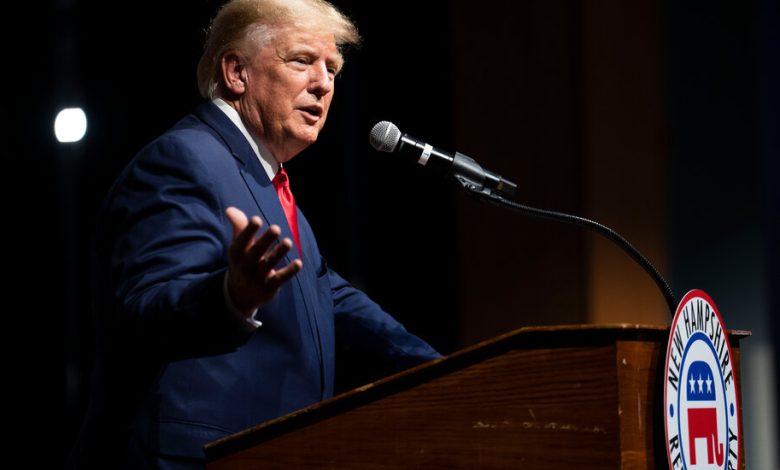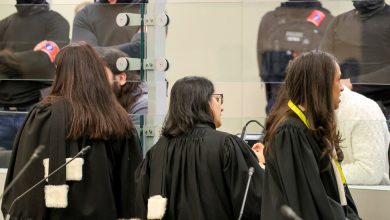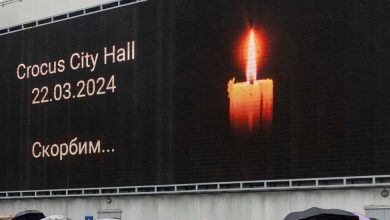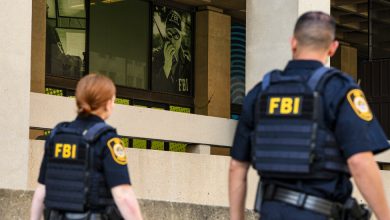Trump Legal Team Assails Georgia Inquiry

ATLANTA — Lawyers for former President Donald J. Trump said late Wednesday that details divulged this week by the forewoman of a special grand jury investigating election interference by Mr. Trump and his allies had “poisoned” the Georgia inquiry.
As of Thursday morning, however, the two lawyers had not filed any motions in court challenging the inquiry. Nor would they discuss what form such a challenge might take, saying only that they were weighing their options. “We’re just considering everything,” one of the lawyers, Drew Findling, said.
Earlier this week, the forewoman, Emily Kohrs, spoke in interviews with a number of news outlets after The Associated Press identified her through a public records request. She said that the 23-person special grand jury, which can only make recommendations on whether prosecutors should indict, had made such recommendations for more than a dozen people in the case. Fani T. Willis, the Fulton County district attorney, who is handling the case, will ultimately make charging decisions and bring them to a regular grand jury.
Ms. Kohrs declined to name names or say which laws the jurors believed had been broken. But asked if Mr. Trump was among those recommended for indictment, she told The New York Times: “You’re not going to be shocked. It’s not rocket science.”
Some outside legal experts have said that Ms. Kohrs’s public comments present a headache, if nothing else, for prosecutors because the forewoman’s discussion of some elements of the case could be seen as diminishing the gravity of the proceedings. Others expressed doubt that they would have much impact, if any, on the case, in part because special grand juries cannot bring criminal charges.
Jeff DiSantis, a spokesman for the Fulton County district attorney’s office, declined to comment on the Trump lawyers’ criticism of the case. He noted that the office had nothing to do with Ms. Kohrs’s media appearances.
Mr. Trump is seen as having two main areas of particular legal jeopardy in the Georgia inquiry: the calls he made to pressure state officials to overturn the 2020 election, and his direct involvement in efforts to assemble an alternate slate of electors even after three vote counts affirmed President Biden’s victory in the state.
Understand Georgia’s Investigation of Election Interference
A legal threat to Trump. Fani T. Willis, the Atlanta area district attorney, has been investigating whether former President Donald J. Trump and his allies interfered with the 2020 election in Georgia. The case could be one of the most perilous legal problems for Mr. Trump. Here’s what to know:
Looking for votes. Prosecutors in Georgia opened their investigation in February 2021, just weeks after Mr. Trump made a phone call to Brad Raffensperger, Georgia’s secretary of state, and urged him to “find” enough votes to overturn the results of the election there.
What are prosecutors looking at? In addition to Mr. Trump’s call to Mr. Raffensperger, Ms. Willis has homed in on a plot by Trump allies to send fake Georgia electors to Washington and misstatements about the election results made before the state legislature by Rudolph W. Giuliani, who spearheaded efforts to keep Mr. Trump in power as his personal lawyer. An election data breach in Coffee County, Ga., is also part of the investigation.
Who is under scrutiny? Mr. Giuliani has been told that he is a target of the investigation, and prosecutors have warned some state officials and pro-Trump “alternate electors” that they could be indicted. Senator Lindsey Graham, Republican of South Carolina, has been fighting efforts to force him to appear before a grand jury.
The potential charges. Experts say that Ms. Willis appears to be building a case that could target multiple defendants with charges of conspiracy to commit election fraud or racketeering-related charges for engaging in a coordinated scheme to undermine the election.
In the interviews — which laid out a number of details of her experience on the grand jury — Ms. Kohrs, 30, said she was trying to carefully follow the rules for jurors set out by the judge, Robert C.I. McBurney of Fulton County Superior Court. Judge McBurney has not barred the jurors from talking, though they are restricted from discussing their deliberations.
The lawyers, however, said that Ms. Kohrs, in discussing the case, had in fact divulged a number of matters that they believed constituted “deliberations,” including details about some witnesses’ invoking of the Fifth Amendment under questioning, and jurors’ discussions about “who to call, why to call them” and “what battles they wanted to fight,” lawyer Jennifer Little said.
But in an interview with the Atlanta Journal-Constitution, Judge McBurney said he told jurors that deliberations are only “the discussions they had amongst themselves when it was just the grand jurors in the room.” By contrast, if a witness or prosecutor was in the room, “that’s not deliberations,” he said. “They’re not prohibited from talking about that, nor are they prohibited from talking about the fruit of their deliberations, which would be the final report.”
It is not clear whether the lawyers’ concerns will have much impact on the Georgia investigation, which has lasted two years but has gathered momentum in recent weeks with the announcement, in January, that the special grand jury had completed its work and had written a final report.
Norman Eisen, a lawyer who served as special counsel to the House Judiciary Committee during Mr. Trump’s first impeachment trial, rejected the idea that defense lawyers could successfully derail the Atlanta case because of the forewoman’s testimony, tweeting: “Not gonna work.”
The concerns about the case were raised in an interview late Wednesday at the Atlanta offices of Mr. Findling, a high-profile defense lawyer who has represented a number of rappers, including Cardi B and Gucci Mane. He was joined by Ms. Little, a former prosecutor in neighboring DeKalb County.
Mr. Findling said that by hinting that the jury had recommended a number of indictments, Ms. Kohrs had “poisoned”the pool of potential jurors for a regular grand jury that could eventually decide whether to issue criminal indictments.
“If, let’s say, there is a recommendation to go to a grand jury,” he said, “all potential grand juries in this part of the country that listen to a radio, read a newspaper, watch TV, go online, look at the news alerts on their phone, are now reading about the deliberations or what could be interpreted as the deliberations of that grand jury.”
Mr. Trump himself blasted Ms. Kohrs on Truth Social on Wednesday for “doing a Media Tour revealing, incredibly, the Grand Jury’s inner workings & thoughts.”
Among the Trump lawyers’ criticisms of the investigation was Ms. Kohrs’s public comment that jurors had discussed media coverage of the case. “They were permitted during the course of seven months to read your newspaper, to read the local newspaper, to watch the news, to go on the internet and apparently even able to bring those sources of material into the four corners of the grand jury room?” Mr. Findling said. “What kind of reliable body is that?”
Special grand juries, however, operate differently than federal grand juries or many state grand juries. There has been no indication, in public filings or in open court hearings, that jurors were prohibited from reading or watching news reports about the case.
Mr. Findling and Ms. Little argued that some of the details Ms. Kohrs discussed underscored what Ms. Little called the “flippant, jovial, almost disrespectful approach” of the broader investigation. Mr. Findling lamented the fact that Ms. Kohrs, in one interview, said that she swore in a witness while holding a popsicle.
Clark D. Cunningham, a law professor at Georgia State University, said Ms. Kohrs’s interviews suggested that the district attorney might be wise to “make no mention of the special grand jury report or its findings” when she seeks indictments before a regular grand jury. That would, he added, preclude arguments from defense lawyers “that indictments were tainted by the views and opinions of the special grand jury.
Mr. Findling said that the legal team did not wish to cast aspersions on Ms. Kohrs personally, saying that the lawyers “hold no chagrin to a young person that has no involvement in the criminal legal system that walked into this.”
Ms. Kohrs could not be reached for comment on Wednesday.
The Georgia investigation has emerged as one of the most potent potential legal threats to Mr. Trump, though there are others. The Manhattan district attorney is investigating hush money payments made to a porn star, and a special counsel in Washington is looking into the handling of classified documents as well as Mr. Trump’s actions leading up to the riot at the Capitol on Jan. 6, 2021.





